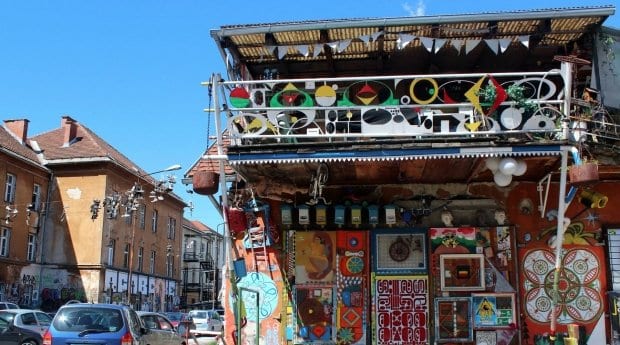Just as a dazed Alice fell down the rabbit’s hole into a realm teeming in colour, most visitors who stumble onto Ljubljana’s alternative cultural centre are left confused and disoriented by its stark contrast with the rest of Slovenia’s surrounding capital city.
By day, Metelkova is a colourful Wonderland of rundown buildings housing art studios, galleries, cafés, bars and music venues. All are infused with multiple layers of graffiti, murals and abstract art installations.
On any given day, artists can be seen touching up their work, advocates can be heard educating about human rights, and the area’s regulars can be seen picking up garbage and discarded cigarette butts. It’s a space of free creative spirit and inclusivity.
Once they’ve found it, tourists are easy to spot in the mix; they gape open-mouthed at the vibrancy of the compound. But when the sun sets and the colours fade, a different side of Metelkova emerges.
Patrons spill in, ranging in age from 15 to 60 years old, to drink cheap beer and sit on a mix of couches and a jungle gym that looks part deathtrap. The vast majority of them are pierced, tattooed, chained and seen as outcasts in conventional society.
The alcohol flows, and the bars and clubs crank up whatever style of music they’re featuring that night. Mixes of anything from dubstep to deep house funk carry over the courtyard that Ljubljana’s punk and alternative scenes have made their nightly home.
Yet Metelkova City is more than just a crumbling centre for artists, activists and non-established cultural groups to congregate. It is considered a living monument to the grim past of a bloodied nation and to the struggle to protect today’s artistic freedom.
Named after the nearby Metelkova Street, the compound was originally built as a military facility for the Austro-Hungarian Empire and then later used by the Yugoslav National Army.
After the 10-Day War in June 1991, in which Slovenia gained independence, the barracks were abandoned to a process of slow deterioration.
It was during this time that Metelkova became a haven for squatting artists and activists, marginalized from a tumultuous society still breaking free from the grips of communism.
When the government decided to demolish the buildings, there was uproar from the complex’s community, called the Metelkova Network. To stop the destruction, they raised awareness about the space by holding concerts and art exhibitions and by sitting in front of bulldozers.
Their efforts garnered the worldwide publicity and media attention needed to save the compound and negotiate an uneasy truce between the city and the community.
Since 1993, Metelkova City has been a self-declared autonomous culture zone. In many aspects it is self-governed, but it continues to be a battle for businesses residing there.
Technically, Metelkova doesn’t have any standing legal status within Ljubljana, yet the government owns it. Neither the cafés nor the art galleries pay taxes, and the complex’s bars and music venues operate without liquor licences. Inspectors often show up unannounced, cracking down on illegal and underage drinking.
But like other reclaimed cultural zones that emerged after the toppling of communism’s era of anti-expression in Central and Eastern Europe, whatever legal technicalities they face are offset by the tourists they draw. It is similar to the underground ruin bars in Budapest.
Travellers from around the world have come to Metelkova’s gates to trace the layers of paint and slogans adorning every available surface and wonder at the delicately placed mosaics. They come to marvel at a thriving community built up from under the rigidity of the past.
Gay men, lesbians, transgender people, the disabled and ethnic and social minorities have all found in Metelkova a place of acceptance where they can socialize freely without persecution.
Although Ljubljana itself is considered a city on the forefront of queer rights in Central Europe, many of the services and venues trace their roots to Metelkova. In 2009, the Q Cultural Centre opened and began operating out of Klub Tiffany — one of Metelkova’s gay venues. It supports and promotes artistic and cultural creativity in the Slovenian LGBT community, as well as educates, presents and researches Slovenian LGBT culture.
Some of its early bleak facilities may have evolved, but the past continues to play a large part in the Metelkova we see today. Among the sculptures and museums showcasing the nation’s bloody past, there is no stronger link from what was to what it is now than Hostel Celica.
Centrally located within Metelkova, surrounded by the ex-barracks, the Soviet prison turned backpacker accommodation is the most officially recognized part of the city within a city.
Celica means cell in Slovenian; if you book a private room at the hostel, a cell is where you’ll sleep. But don’t expect a barren, grey room. Despite their original barred doors, each cell has been converted into a unique art installment with more than 80 artists contributing to the effort.
With the international attention being paid to this little artist’s hub in the middle of one of Europe’s smallest capital cities, the local government is no longer trying to demolish it. However, even with municipal support, Metelkova’s future remains uncertain. There is talk of legalizing it, which could prove detrimental to the very essence of how the compound is operated.
In time, it could take the same path as the Five Points neighbourhood in New York, as gentrification and economy-driven agendas edge out the subcultures and communities. Metelkova could become home to mainstream restaurants and trendy bars, catering to a crowd very different from its original communities.
But for now, visitors can still hang out in this vibrant, continuously changing, inclusive art space, drink underpriced beer and meet the welcoming group of people who have made this extraordinary base their home for the last 20 years.

 Why you can trust Xtra
Why you can trust Xtra


